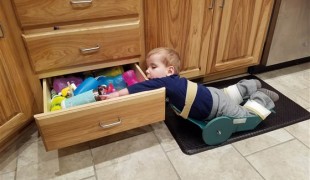- 8572
- 587
- 13
- 15
- 0
- Help Ukraine
About the solution
Chance was born without arms and legs (he doesn’t have legs but has partial feet and arm stumps).
It’s hard for the boy to navigate around their home and engage with other people. There are self-propelled wheelchairs, but no motorised solutions available on the market.
So Chance’s family made a request to charity May We Help (an organisation that develops gadgets to increase the autonomy level of disabled people).
“His only means for transportation is rolling around on the floor or moving around like an inchworm. He is always on the floor. It would be amazing if he could climb into a chair like Jovia’s that would allow him to go outside and go for a walk, to sit up instead of laying on the ground all the time. It would be a significant move towards independence”, they explained.
So Chris Garner, from May We Help, built him a pediatric powerchair, using an adapted pediatric wheelchair, motor, plastic and metal.
The boy got this device in 2015, and thanks to it he is able to independently navigate his environment and participate in activities with his siblings and friends.
Adapted from: https://bit.ly/2WJRhrU
This solution shall not include mention to the use of drugs, chemicals or biologicals (including food); invasive devices; offensive, commercial or inherently dangerous content. This solution was not medically validated. Proceed with caution! If you have any doubts, please consult with a health professional.
DISCLAIMER: This story was written by someone who is not the author of the solution, therefore please be advised that, although it was written with the utmost respect for the innovation and the innovator, there can be some incorrect statements. If you find any errors please contact the patient Innovation team via info@patient-innovation.com
-
-
390
-
0
-
4690

Collaborator Pierluigi Mantovani creates Evolution Devices - solutions that aim to transform Multiple Sclerosis Management
CAREGIVING
BODY BALANCE: Maintaining body balance
STANDING UP: Standing up from a seated position
WALKING: Walking
Multiple Sclerosis
Assistive Daily Life Device (to help ADL)
Walking Aid (wheelchair/walker/crutches)
App (Including when connected with wearable)
AI algorithm
Body-Worn solutions (Clothing, accessories, shoes, sensors...)
Restoring mobility
Regaining sensory function
Managing pain
Promoting self-management
Preserving Organ Function
Managing Neurological Disorders
Maintaining Balance and Mobility
To improve Treatment/Therapy
Preventing (Vaccination, Protection, Falls, Research/Mapping)
Raise awareness
Caregiving Support
General and Family Medicine
Internal Medicine
Medical Genetics
Neurology
Physical Medicine and Rehabilitation
United States
-
-
-
710
-
0
-
10410

Dad creates device to help 2-year-old son with spina bifida
CAREGIVING
BODY BALANCE: Maintaining body balance
Spinal Cord and Nerve Root Disorders
Assistive Daily Life Device (to help ADL)
Strategy/Tip
Gait abnormalities (e.g., walking difficulties, unsteady gait)
Difficulty coordinating movements
Stiffness or rigidity (difficulty moving)
Paralysis of the legs and lower body
Muscle weakness
Loss of balance
Cognitive impairment
Restoring mobility
Maintaining Balance and Mobility
Preventing (Vaccination, Protection, Falls, Research/Mapping)
Caregiving Support
Medical Genetics
Neurology
Neurosurgery
Pediatrics
United States
-
-
-
366
-
0
-
3722

Student invents device to help with arm mobility
BODY BALANCE: Maintaining body balance
CAREGIVING
Bone Disorders (Decalcification, Bone Deformity, Bone Fracture, Bone Infection)
Gastrointestinal Bleeding
Assistive Daily Life Device (to help ADL)
Limited range of motion
Reduced grip force (grip)
Loss of muscle coordination
Joint deformity
Swelling or inflammation
Blood in the stool (hematochezia)
Restoring mobility
Maintaining Balance and Mobility
Preventing (Vaccination, Protection, Falls, Research/Mapping)
Caregiving Support
Cardiology
Clinical Hematology
Infectious Diseases
Medical Genetics
Orthopedics
Pediatrics
United States
-
 en
en